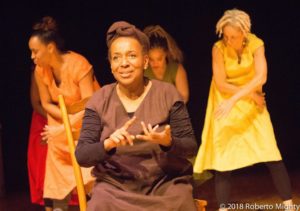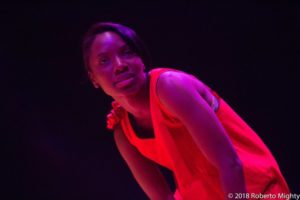
(Left to Right):Tonasia Jones, Kerline Desir, Dayenne C. Byron Walters, Ciera-Sadé Wade, Thomika Birdwell, Karimah Williams, Verna Hampton. Photo Credit: Roberto Mighty
by Mike Hoban
‘for colored girls who have considered suicide/when the rainbow is enuf’ – Written by Ntozake Shange; Directed by Dayenne CB Walters; Music Composition by Patrick Casky; Choreography by W. Lola Remy; Costume Design by Cassandra Cacoq; Lighting Design by Ashley Yung. Presented by Praxis Stage at Hibernian Hall, 184 Dudley St. in Roxbury through February 25th.
Given the current state of political affairs, there may not be a better time to revive for colored girls who have considered suicide/when the rainbow is enuf, now being presented by Praxis Stage with an extraordinary production at Hibernian Hall through next weekend. Praxis was formed on November 9th, 2016, “as a response to the disaster of Trump’s election” according to their mission statement, and there are few theatrical works that better portray the ability of African-American women to persevere and be a force than “for colored girls” – as we saw in December when they were the primary driver behind the defeat of Trump-backed Roy Moore in the special Senate election.
Developed by Ntozake Shange, who dubbed the piece a “choreopoem”, for colored girls is 21 “poems” enriched by beautifully choreographed movement and occasional splashes of music that explore topics like racism and sexism, but also the loss of lovers, disappointment, rape, and in the evening’s most horrifying moment, the death of children. The play has long been a staple on college campuses, but director Dayenne CB Walters has given it a different slant, casting women of all ages, from their early 20’s to veteran actor Verna Hampton, who told the talkback audience that she was now a “great-grandmother”. The seven characters in the piece hail from “outside” of cities like Chicago, Detroit, Houston, Baltimore, San Francisco, Manhattan, and St. Louis. None of them have names, but instead are identified only by the color of their dress, so we get the Lady in blue, red, yellow, orange, brown, green and purple.

Many of the “poems” are more like short stories, beginning with the second vignette, “Graduation” where the Lady in Yellow (played by Walters herself) tells the tale of losing her virginity to one of her male friends in the back of a Buick on the night of her graduation. In ‘Latent Rapists” three of the women share that, while they had always been taught that rapists are strangers “lurking in the bushes”, each had been violated by a man that they knew and dated. A third story, “Pyramid”, again involves three women, all attracted to the same man. He chooses one, then seduces her friend. When the two women confront him, they find him with yet another woman, but the two women then heal together. Men don’t fare too well in these stories, but it never feels like male-bashing, and sadly, little seems to have changed in the three-plus decades that have passed.
As interesting as the multiple character vignettes are, there is something about the solo pieces that allow Shange’s brilliant melding of language and movement to really soar. The actors (who are uniformly excellent) rise to the level of the writing, especially with lines like, ”I couldn’t stand being colored and sorry at the same time – because it was redundant” or “You hurt me more than I can dance myself out of, and into an oblivion isn’t far enough to get out of this.” Hampton (as the Lady in Brown), shines in the piece “Toussaint” where, playing an eight-year old girl who discovers the writings of Haitian revolutionary Toussaint L’Ouverture, makes him her invisible friend, and goes on an adventure with him.
There’s also Tamika Marie Bridwell’s brassy but vulnerable turn as the Lady in Green during “Somebody almost walked off wid alla my stuff,” where she dresses down a former beau who has not only made off with all of her material things but also the intangibles that make her who she is. But it is the work of the Lady in Red (Kerline Desir) that was the most notable. Given three of the most powerful vignettes, “one” (about an empowered woman seducing men and kicking them to the curb), “assistance”, and the all-too-real “a nite with beau willie brown,” Desir gives an amazing performance, which is all the more surprising given that she appears to be a relative newcomer to the stage.

As heartbreaking and discouraging as the content of many of the poems may be, there’s still a light that shines through this production, especially with the closing piece, “a layin on of hands,” with the refrain, “I found god in myself – and I loved her” is just beautiful. It is not often that one sees seven women on stage at once in theater, never mind seven women of color. But that’s not the reason to see this outstanding production. Go and see it because it’s just that good. For more information and tickets, go to: https://www.praxisstage.com/

